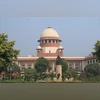The Supreme Court on Friday asked the Uttar Pradesh government to maintain "peace and harmony" in Sambhal as it halted any action by a court in that town regarding the survey of the Shahi Jama Masjid until January 8.
It instructed the mosque committee to challenge the local court’s survey order in the Allahabad High Court, where the case is expected to be listed within three days.
Sambhal case: Court’s directions on survey report
The top court emphasised that the advocate commissioner’s survey report must remain confidential. “We hope and trust the trial court would not take any further steps in the matter until the high court takes up the proceedings in relation to the matter and passes suitable orders,” it said.
This decision came after violence erupted during the survey of the mosque on November 24, resulting in four deaths. In response, the Uttar Pradesh government appointed a former Allahabad High Court judge, Devendra Kumar Arora, to lead a three-member committee tasked with investigating the violence.
Sambhal row: Legal challenge over mosque survey
The controversy began on November 19, when eight plaintiffs, including Supreme Court lawyer Hari Shankar Jain, filed a suit in Sambhal’s civil court. They claimed that the Shahi Jama Masjid was built on the site of the “Harihar Temple” and sought access to the site, referring to it as a temple. Jain, along with his son Vishnu Shankar Jain, has previously been involved in similar suits, such as those related to the Gyanvapi mosque in Varanasi and the Shree Krishna Janmabhoomi-Shahi Idgah in Mathura.
Also Read
Court's order sparks immediate survey
On the same day the suit was filed, the local court appointed an advocate commissioner to conduct a photographic and a video graphic survey of the mosque. The order was passed without notice to the mosque management, and the survey was conducted within hours. Another survey was carried out five days later, with less than six hours' notice to the mosque committee.
Mosque committee seeks SC's intervention
In response, the mosque’s managing committee approached the Supreme Court, seeking an immediate stay on the survey. The petition argued that such surveys, particularly of historic religious sites, could lead to communal tensions and undermine India’s secular fabric. The mosque committee also questioned the legality of the survey, citing the "haste in its implementation" and the lack of an opportunity to contest the court order.
Legal basis of mosque committee’s petition
The petition highlighted concerns that the survey violated the Places of Worship (Special Provisions) Act, 1991, which prohibits changing the religious character of any place of worship as it stood on August 15, 1947. The petition also referenced the Ancient Monuments and Archaeological Sites and Remains Act, 1958, which protects historic places of worship from desecration or misuse.
Additionally, the mosque committee pointed out procedural issues with the civil court's order, including the absence of any clear reasoning or terms of reference for the survey. The committee argued that such surveys are increasingly being ordered in disputes over places of worship, potentially inflaming communal tensions.

)